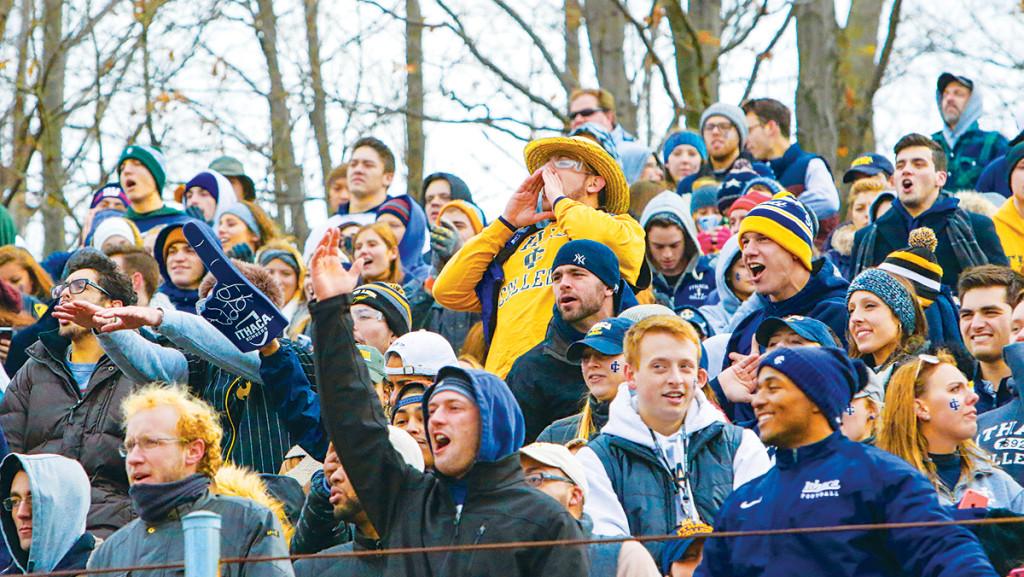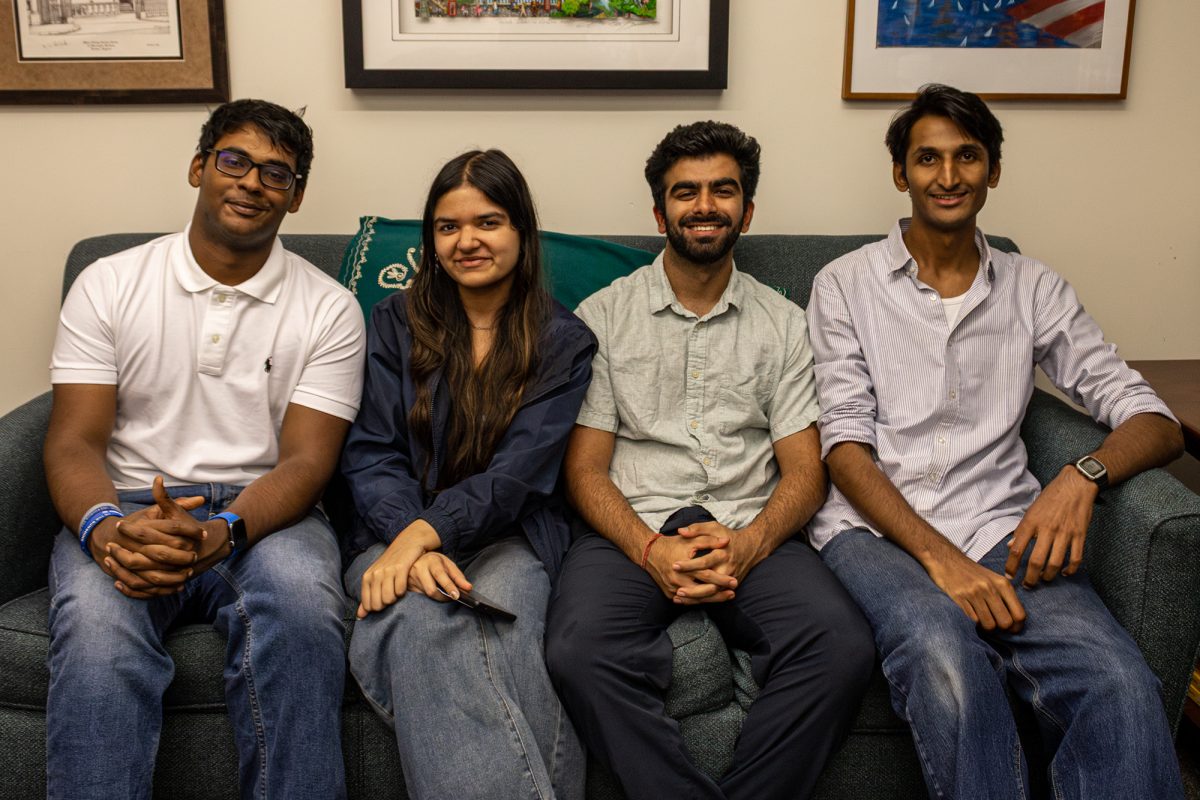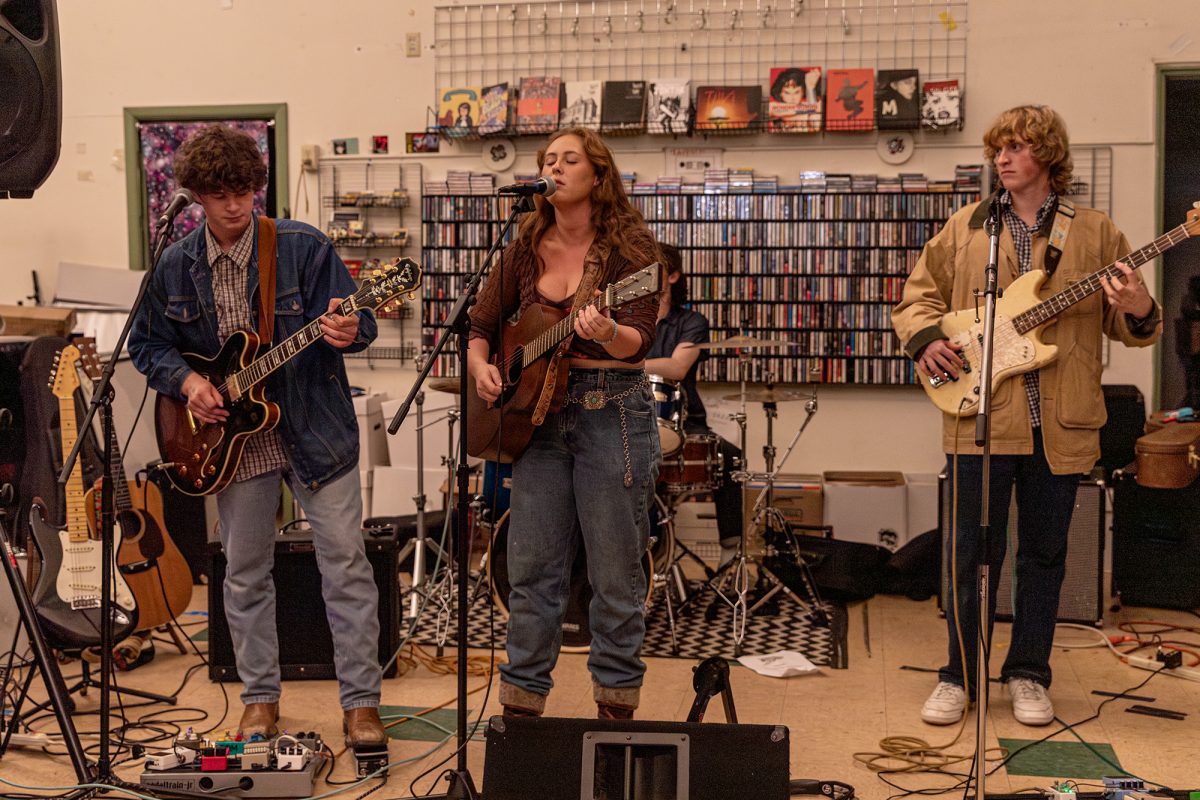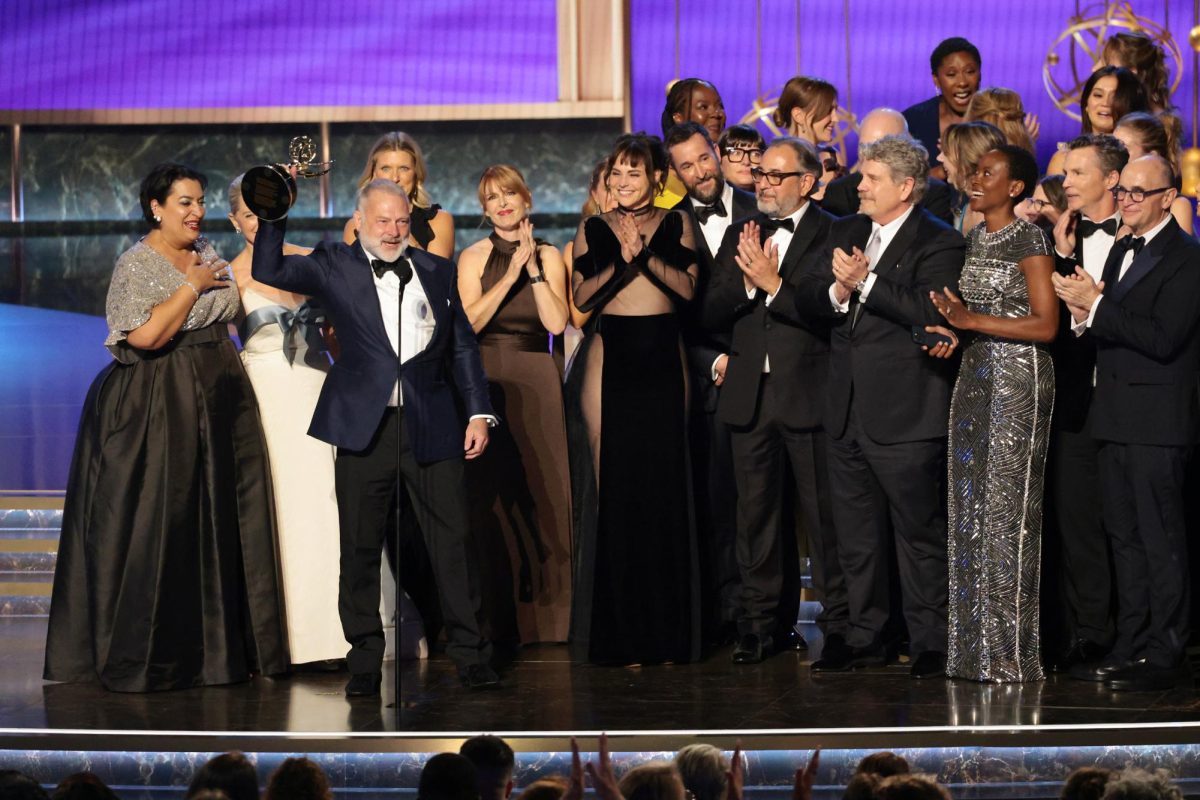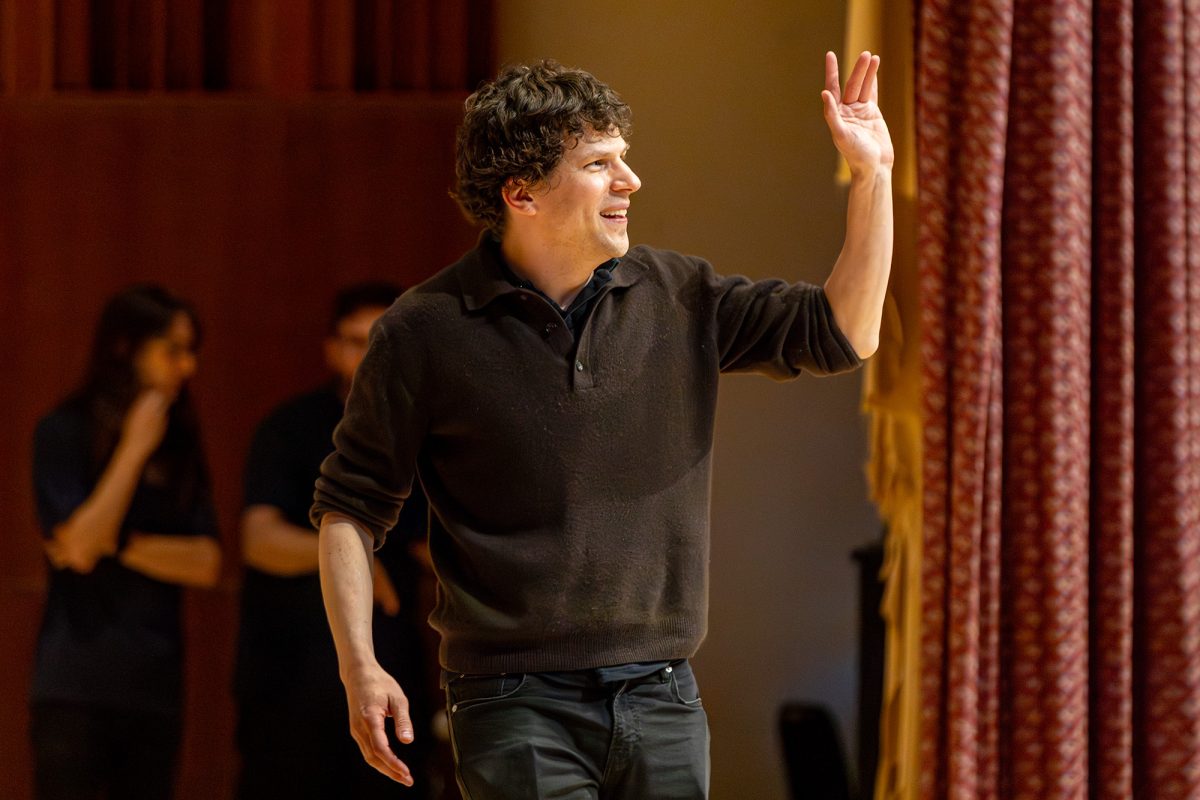[acf field=”code1″]
The screaming began at exactly 8:11 a.m.
“Let’s go BOMBS!”
“Fuck Cortlaaaand!!!”
They weren’t screams so much as they were greetings. In a way, that made them more frightening. Shouted from balconies and out of doorways to those who carried clanging-bottle bags in from their cars, through held-open doors the salutations rang:
“Let’s go Bombers!”
“Fuck yeah, Cortacaaaaaaaa!”
1/4 — Pregame
It was the start of that year’s quintessential rivalry game day, in which the Ithaca College Bombers squared off against the SUNY Cortland Red Dragons. As with most college rivalries, it had little to do with football: Though Cortaca itself has gained fame as the Biggest Little Game in the nation, able to be bet upon alongside the Division I big guns, for most of its attendees, Cortaca meant something different. Some thought of this day as more important than graduation: At an hour that’s difficult to make it to class, waking up for Cortaca was easy. Almost any task is made easier when you wake up with a beer already in hand.
They readied themselves by taking several shots of Fireball and flavored Smirnoff’s for breakfast, steadied themselves by taking a longer-than-usual time to dress, donning the women’s Cortaca uniform: flannel shirt, leggings and winter vest, baseball cap, long socks and face paint — all, of course, preferable if colored Bomber Blue and Gold. They, too, called themselves Bombers, and they had pride without knowing why: They knew they’d lost last year, and the year before that and the year before that and the year before … really, they knew they’d lost a lot, but couldn’t put a finger on how many times. (Ithaca had been defeated for the past five years, in fact. A sixth would make it Ithaca’s longest losing streak in Cortaca history, and based on the teams’ season records, was almost inevitable.)
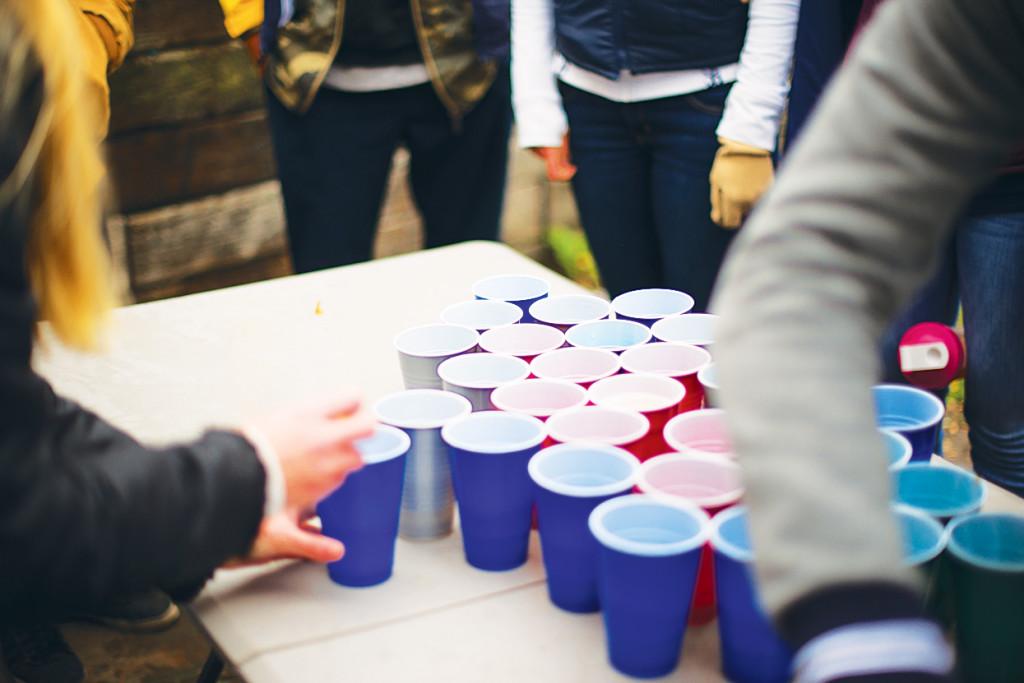
After an hour, they transferred mixed drinks to take–out containers or Vitamin Water bottles, rendering them conspicuous with oddly tinted contents. From every corner of campus they paraded, sashaying out of dorms and apartments, laughing loudly and making their way — albeit crookedly — to the stadium on the far west end of the hill. Soon, on Ithaca College’s main quad was the largest gathering of students since … well, since last Wednesday, when a thousand or so of the fans had turned out to block the very pathways they were walking down now, part of a protest against President Tom Rochon and the racial climate of the place. Led by people of color on campus, a group known as POC at IC, they received national media attention that day. Now, with flashy cameras gone, the excitement of protesting had faded. There were rumors there’d be more disturbances today, rumors that had been quelled by threats of violence posted on YikYak: “If you try anything on Saturday you’ll be jumped”; “POC you have been warned.” Although appalled, these Bombers chose to carry on. But who could blame them? The college only had one day to go crazy: At any D1 school, there’d be a Cortaca-caliber celebration every weekend. It was no one’s right to revoke their fun, even if it had been revoked from the people of color leaving campus for their own safety.
For outrage, there would be plenty of other days. But not today.
By 9:30 a.m., all parking lots nearest the game were filling quickly with cars and with crowds — although, according to the girl manning the neon-striped traffic gates, visitors had been waiting for her at the beginning of her 7 a.m. shift, kegs at the ready. She volunteered for the work, she said. “It was either this or sleep. At least this way I get paid. I mean … I just don’t understand people! How can you do this?”
She gestured toward the lot where the students crowded around a gray pickup truck, its flatbed full of ice. The goal was simple: to drink enough to keep a buzz throughout the game without bringing alcohol into the stadium. This could be done in myriad ways, but the most popular was to pregame at the tailgate. And pregame they did: Upperclassmen brought beer and bottles of cheap champagne and passed them out to passersby, no ID required.
It was mad, it was wild, it was the mayhem of human waste. When the people moved, they barely picked up their feet for fear of tipping in their tipsiness, shuffling across discarded Jell-O shots and shredded beer boxes and abandoned Solo cups. In the middle of it all was — bizarrely — a Catholic chaplain in his collar, congenially clasping arms and taking selfies with the revelers. He turned down several beers, smiling.
“Not for me, thank you. I don’t start drinking till at least noon,” he joked.
It was an hour till kickoff, and already the ground glistened with beer that had been spilled by hugs and lazy elbows and, perhaps, some that had already made its way back up from stomachs. It made for a rancid smell, coupled with a strong reek of weed, petroleum grills and hot–dog water. With crushed cans, the bros played basketball with a toy hoop, adding the scent of overworked deodorant to the mix. As they dunked and cheered and swigged and swaggered, the crowd swelled to double, triple, quadruple its starting size. In no time, there were hundreds of people — or, at least, enough to keep the boys bouncing around the crowd like wobbly pinballs. More filtered down from the Terraces, Towers and Circles above, trudged up from the Gardens and Quads below, spilled out of cars and TCATs that had rerouted around the constant-motion mass of messy students.
Some women in Ithaca-yellow vests picked their way carefully through, maintaining a “positive presence” in the throng; a trio of police officers watched from the corner of the lot, waiting for real trouble as the crowd shouted and sprayed one another with beer. The pace of the party was rapidly accelerating: soon, the few remaining sure-footed students resigned to following their sloppier friends around, holding the backs of their shirts to keep them from falling like mothers might do to their toddlers.
Every so often, the man standing on the flatbed started the cheer:
“When I say ‘Fuck,’ you say ‘Cortland’! Fuck —”
“— Cortland!”
“Fuck —”
“— Cortland!”
The screaming, which had begun at 8:11 a.m., was to last another 13 hours.
Not a single voice could say why.
2/4 — Game on
At 11:30 a.m., in an unspoken but communitywide shift, students flocked toward Butterfield Stadium, taking a long last sip from hidden flasks and bottles before dropping and kicking, usually toward the Cortland side. “Hopefully they’ll roll their ankles,” someone shouted, and the crowd around him roared with laughter. Some braver Bombers would try to smuggle them in, unintimidated by the mild security pat-downs, determined to stay entertained in spite of the game.
The live radio announcer blasted the ticket lines: “The Bombers have absolutely nothing to lose!” And it’s true: The Bombers didn’t have much in the first place. They had Butterfield Stadium, a big divot in the side of South Hill, its crumbling slag slowly sliding past another era’s metal bleachers. They had a fistful of prior losses, including last year’s rather devastating miscue in the final minutes, a moment watched with drunken disappointment on many an Ithacan computer screen. They had their name, but that was it: not a flying squirrel, phoenix or lake beast in sight. The president had recently called the lack of mascot one of his greatest failures. Really. Truly. The Bombers had little at stake today.
Most of the crowd had never been here before; they found the view of Cayuga Lake particularly mesmerizing. In their stupor and their boredom, it almost seemed as though they could reach out and touch the calm, blue water, could escape the noise and the sweaty press of bodies balancing on the chain-link ledges. It was standing room only, or else an uncomfortable squeeze onto the bleachers, where blurry, bleary enthusiasm caused more than one back to be accidentally bruised by a wayward kick.
For every Butterfield first-timer there were virgins of another kind: Cortaca, for some, was a first time getting drunk. For example, the three freshman girls in pink–felt hats who stumbled up the path asking each and every person they passed, “Where are we? Who are you? Who am I?” They were giggling, swept up in the hysteria of 10,000 plastered people all talking at once, punctured here and there only by a distant shrill whistle or low bass beat. Neither sound could hold its own against the chatter.
There may have been constant talking, but few knew what they were talking about. In fact, the general mood of the crowd was one of contented confusion. When, five minutes in, the stadium began to boo, two girls with gold-and-blue glitter on their cheeks debated what was happening:
“I think the other team got a kick point.”
“What’s that?”
“It’s cheating, that’s what it is. It’s bullshit.”
“Yeah, what’s a kick point, anyway? They’re not even real!”
The drunker of the two blinked, touched her fingertips to her glitter streaks and asked, “What are we doing? Why are we even here?” To that, her friend could only laugh.
Meanwhile in the stands, a dark-haired young woman none-too-carefully threw back a shot of pineapple vodka, crushing the knees of the people behind her, then shouted, “Passionfruit is fantastic!”
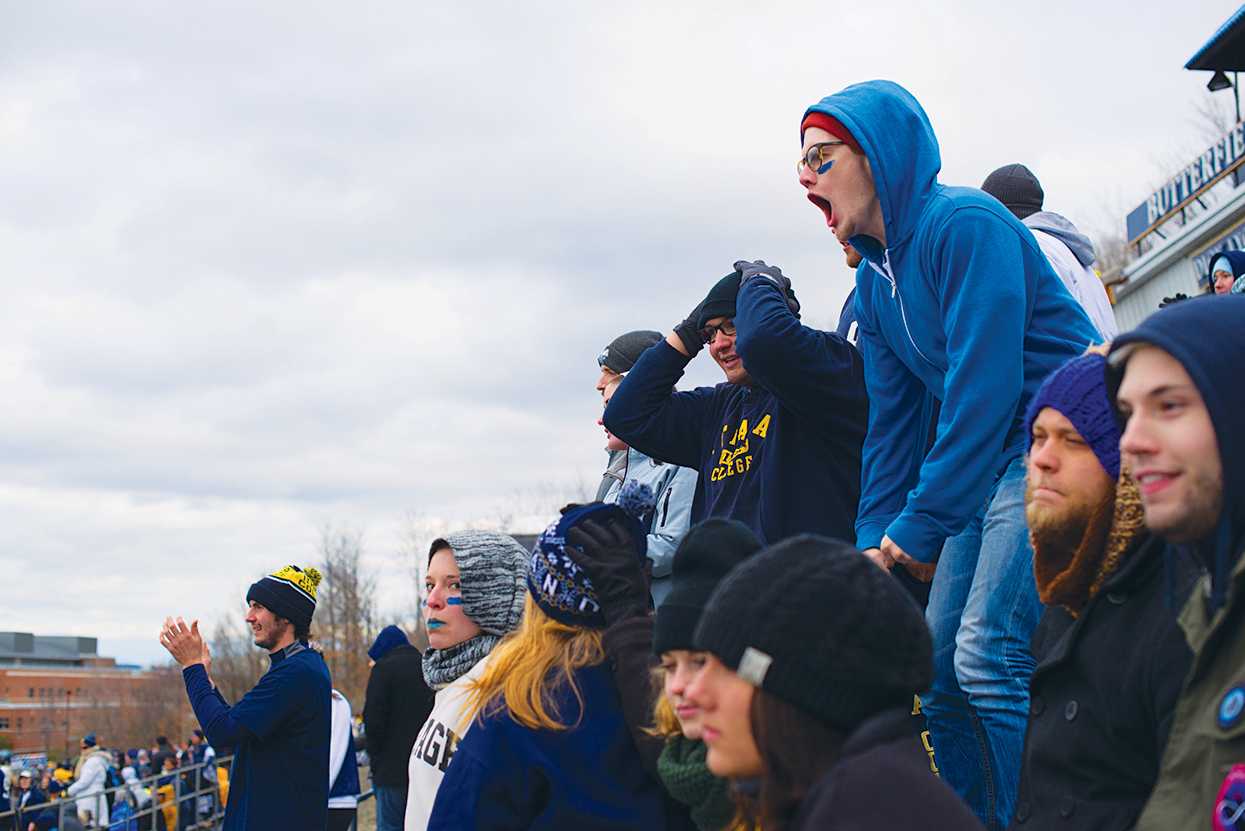
In rare moment of clarity, the crowd assembled once more into one voice. After all, someone must have been in the lead, scrounging the happy masses into a coordinated cheer or boo. Something must have been putting these words in their mouths other than the muddled inner workings of their minds. But what was it? Or who? Someone in the sea of faces must have had a concrete idea. It wasn’t the girl manning the parking lot, it wasn’t the Ithaca-yellow vests, not the police, not the radio announcer, not Rochon, not the players. It wasn’t the game itself. Who, what was holding Cortaca’s reigns? Who decided this? Who chose this way for the Bombers to behave?
No one did, and yet somehow, all of them did.
From somewhere in the upper stands, a man with a hoarse voice was smart enough to amend the chant so they wouldn’t be thrown out:
“Let’s go Bombers!” Stomp, clap, clap-clap-clap.
With each repetition, the stadium fell more in rhythm. Tiny pieces of shale started to slide down the slope.
“Let’s go Bombers!” Stomp, clap, clap-clap-clap. “LET’S GO BOMBERS!” Stomp, clap, clap-clap-clap.
And, in the moments before the coordination dissolved into indistinct yelling, the sun came out.
Glitter Girl squealed and jumped up and down. “It’s a sign!” she shouted. “It’s a sign!”
3/4 — Waiting
By halftime, the pregame excitement had waned. The wind — or some other unseen force — had dealt the Bombers several significant gametime blows, though of course for most of the spectators, these went unnoticed. Soon, the swell of people was pushing out of Butterfield rather than in, coming down off its buzz as it progressed sluggishly down the hill.
“This is such a waste of time. I don’t know why we even go to this part.”
“I’ve literally been waiting this whole game just to leave.”
“Who’s winning?” “Who cares?” The score was 9–0 Cortland.
“Should’ve come more prepared. Some people brought stuff.”
“Maybe I can find my flask on the way out of here.”
On the way down from the stands, Passionfruit-Pineapple Girl shouted, “I’m going to go harass that guy because I’m drunk, so I can do that!” before promptly falling over two rows of bleachers into the arms of a cop.
Those who stayed behind remained just as confused as before, perhaps using smuggled goods to carry on their intoxication: A group of boys with bloodshot eyes wandered near the fences, cheering, “Let’s go boys! C’mon Bombers!” for the duration of the hip-hop dance team’s halftime performances — the only 15-minute time frame during which females were on the field.
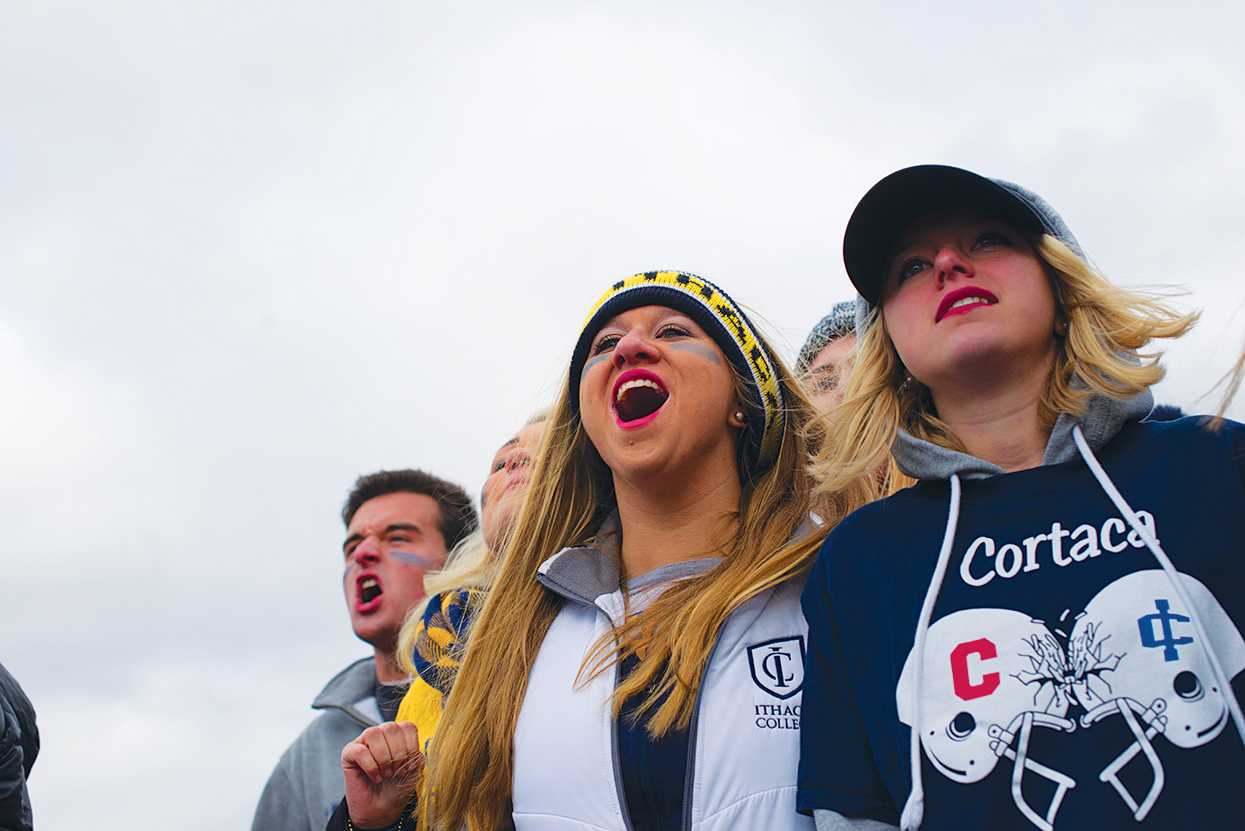
Three girls spent the third quarter waiting in line for the bathroom, passing time till the game could be over.
“Those Cortland girls better lose those ugly-ass pom-poms,” the one wearing a gray Ithaca College sweatshirt shouted to no one in particular.
“I could be watching the game right now, but I can’t really see,” her black-scarfed friend said giddily.
Gray Sweatshirt waxed philosophical: “I feel like this is all more of a production than it actually is worth. It’s all about the pregame. It’s all about the postgame. But none of it is about the actual game. Like in reality, no one gives a shit cuz WIN OR LOSE, WE BOOZE!” She thrust her fist in the air. “Oh crap.” She hastily took it down again. “Don’t wanna do that.”
“Yeah, don’t do that!” Black Scarf snorted back her laughter. “That’s POC at IC shit.” Unbeknownst to most, a few Ithaca College players had flashed a Black Power symbol proudly when their names were announced before the game.
“It’s insensitive, but at the same time, I don’t know. I wonder when they’re going to be here. Like that’s scary. I feel bad about all that YikYak stuff but…” Their third companion seemed less drunk and less sure than the other two.
Gray Sweatshirt helped her out. “This isn’t a serious school matter. It’s our one fun day of the year. I mean, c’mon!”
Her friends nodded, and she continued. “I think one of the things is like they’re trying so hard to prove a point that they are willing to squash every other opinion or every other opposition that comes up on them, and by doing that, they’re actually invalidating themselves.”
“I mean, it’s no one’s right to be on the field during the game,” the soberer girl reasoned. “It’s not like they’re taking it away from anyone, and there’s no need for you to ever take it.
“If we win or lose, we don’t storm the field so why should they do that? You know what we do do? WIN OR LOSE, WE BOOZE!” Gray Sweatshirt said.
The trio laughed, and Black Scarf stumbled a bit on the rocks as the line moved up.
“I think they really take that to heart,” Gray Sweatshirt continued. “No one plays shitty on it. Everyone plays their hearts out because —” She paused, seeming to lose track of whether she was talking about the fans, the football players or the protestors. “—because we don’t get to act like this on a typical Saturday game. No one even goes!” Ah. The fans.
By 2:30 p.m., Butterfield Stadium was running on empty. The Bomber footballers had already missed two of their “kick points.” Though they’d rallied in the last quarter, in the final minutes the score stood still: 8–11 Dragons. Finally, the weary watchers funneled out of the stadium, most of them back, actually, to their funnels. That men had smashed helmets together in hopes of securing some victory didn’t change the scene, didn’t sway or stop the screams from carrying on, although somewhat more tiredly:
“Let’s go Bombers!” Stomp, clap, clap-clap-clap.
“When I say ‘Fuck,’ you say ‘Cortland.’ Fuck —”
Only 10 hours to go.
Those who drove vacated the place pretty quickly, cars filled past capacity due to a dearth of designated drivers, making illegal K-turns to avoid the mass of students flooding the street. Stomachs grumbling, the walkers dialed Sammy’s or D.P. Dough for pizzas, searched for Wings Over on their iPhones or, begrudgingly, crept toward the dining halls, preparing to post the sparse selections on Instagram.
With a last longing whoop, the campus collapsed into its annual mid-Cortaca nap. A few rallied against the looming hangover, preferring to roam the campus in disheveled bands, mildly harassing anyone they passed wearing red. Back down the pathways they went, Bombers breaking through the heart of campus again. They didn’t understand or care too much why they had lost; at least it didn’t change their postgame plans. They were grateful for a lack of significant disturbance, grateful to know where they were supposed to be going, eager to chalk their losses up to simple bad luck. But maybe it was more than that. Maybe it had something to do with the ground they walked upon, something to do with how they’d disturbed a native burial ground by building Butterfield, something to do with their lack of grappling with this fraught history. After all, the Bombers who now compete for the Cortaca jug used to be called Cayugans, named after the tribe the college’s land had been taken from; perhaps the stronger loss sprung from the bones dug up again and again by a ruckus of unconscious Bombers, an explosive influence felt far more deeply than they could see from their high-above planes.
Rumor had it that while the campus slept, at least one girl jumped into the fountain. Tradition stated that jumping in the fountain early ruined the jumper’s chances at graduation.
Oh well. At least she had Cortaca.
Most of the fallen Bombers slept dreamless sleeps. Those who didn’t dreamt in strange half-truths, unable to dislodge the feeling of shifting earth from their feet or the white-noise roar of the crowd from their ears. They tangled their sheets in restless wrestling, some fighting the urge to vomit, others choking down unwanted memories. Limbs heavy with drink and fatigue, they kicked away weakly the memory of their loss, the memory of losing before they even began, the memory of the dream they’d been having that morning when they’d been woken up by —
“Let’s go BOMBS!”
“Fuck Cortlaaaaand!”
In its eleventh hour, Cortaca was dragged back to life, and not one dreamer dreamt of what it had been dragged by.
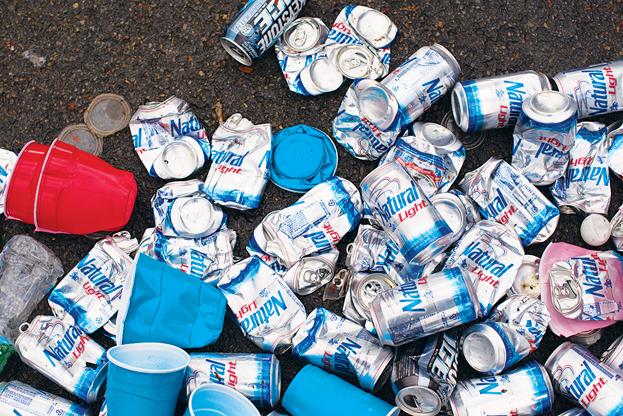
4/4 — Win or Lose We Booze
For some reason, the mania of the morning surged anew with the purple sunset. Once more, drinks were called for, but even the most enthusiastic felt the strangeness of a hair-of-the-dog tactic at this time of day. Bedraggled, they threw shots back like medicine and tried to revive their initial excitement. And, on the surface, it worked. They cranked up “Hotline Bling” and prepared for after-parties, still cheering out their windows.
Any other time, they would have dressed to the nines. But not now. This was more a celebration of survival than a celebration of life. Most of them had that dirty-jersey-crinkled-jeans-crumpled-shirts-smudgy-makeup look, traipsing down the hill toward town while taking lazy swallows from paper bags. They slouched into lines in front of houses on Kendall and Penn and Hudson, saying things like, “Can’t believe we made it” and “Damn, was this walk even worth it?”
“Of course it was! It’s Cortaca!”
The real question might have been this: Why did they even get out of bed? Perhaps it was that weird wellspring of pride again. Bombers had one day to do this, and they were determined to do it right. Perhaps they were just too tired and dehydrated to resist. But then, what pressed them on? Who dictated the terms? It was easy to follow the patterns but not to dissect the design.
They were past the point they normally would have enjoyed but carried on anyway. There were signs: Unlike most weekend nights, the house parties’ music wasn’t loud enough to hear from the street. Once they got in, some people didn’t even bother to take off their coats, trying instead to sweat out their last six shots. Kids with dark-circled eyes walked the fine line between exhaustion and ecstasy, calculating how much they could take in before they gave out, how much they needed to be happy enough to stay awake. More than once, the hosts had to run out and get more beer. More than once, when they went, the stores were out. Downtown in the bars, upperclassmen — and underclassmen who could afford it — were picking walls and sticking to them, sipping overpriced drinks in the semidarkness.
Then, a shift. The second wave of booze was hitting them hard over the head, twisting their limbs into a semblance of consent as they thrashed halfheartedly on the dance floor. In the basements of house parties, black lights brought the partiers’ whites to life as the music churned the masses back into a feverish stupor once more. At the bars in the blue, red and green beams of light they danced, too, heads lolling carelessly, arms by their sides — at least, until the DJ shouted, “You want some Bieber? Who wants some Bieber?” And, remembering the call-and-response from earlier, the Cortaca crowd roared, throwing its hands in the air.
It was as simple as that: As soon as they were gone enough to have forgotten the day’s earlier jaunts, it was easy. Here they writhed in Cortaca’s prime. A moment aside from the everyday, a moment away from the lameness and listlessness of real life. A puddle in the dry, dry desert of shamefulness. An odd, unexplained excuse to drop reality and savor, instead, what those D1 colleges taste all the time.
They forgot what they were there for; they forgot how they even got there. By midnight, some were attempting the trek back to campus, following curbs to at least a street they recognized the name of. No one was in a rush. Sleeping now would only bring tomorrow’s troubles faster, would only lead to more of those mild nightmares.
And yet, if they’d done Cortaca right, there was hope. Hopefully, the next day they’d wake with only fond, fuzzy memories of things that might never have happened. They’d have a headache, granted, but otherwise, most would survive the night unscathed. They’d have no memory of the second orders of food they’d placed before they passed out, the crew of confused deliver men waiting by residence halls like grumpy guardians. They’d piece it together with phone records and recycling-bin piles and other people’s photos. The day would exist, a pearly, nebulous period apart from their responsibilities, apart from the mundane multitude of perfectly ordinary days.
Who could blame them for wanting to escape?
At 1:29 a.m. the last drunk bus wended its way up South Hill, its interior lit with a soft blue that glowed well beyond the windows. It was packed and sweaty and tired, but despite it all, the cheers began to rise:
“Let’s go Bombers!” Stomp, clap, clap-clap-clap.
The momentum tripped on itself, then gained again as the bus continued its climb.
“Let’s go Bombers!” Stomp, clap, clap-clap-clap.
“LET’S GO BOMBERS!” Stomp, clap, clap-clap-clap
And, just as suddenly as it came, the last surge of the day faded into conversational hum. It lingered, though, in the battled ears of the Bombers, where the hours and hours and decades and decades of decibel overload rang:
“Let’s go BOMBS!”
“Fuck Cortlaaaaaaaand!”
They were unable to hear the music the rest of the way home.



